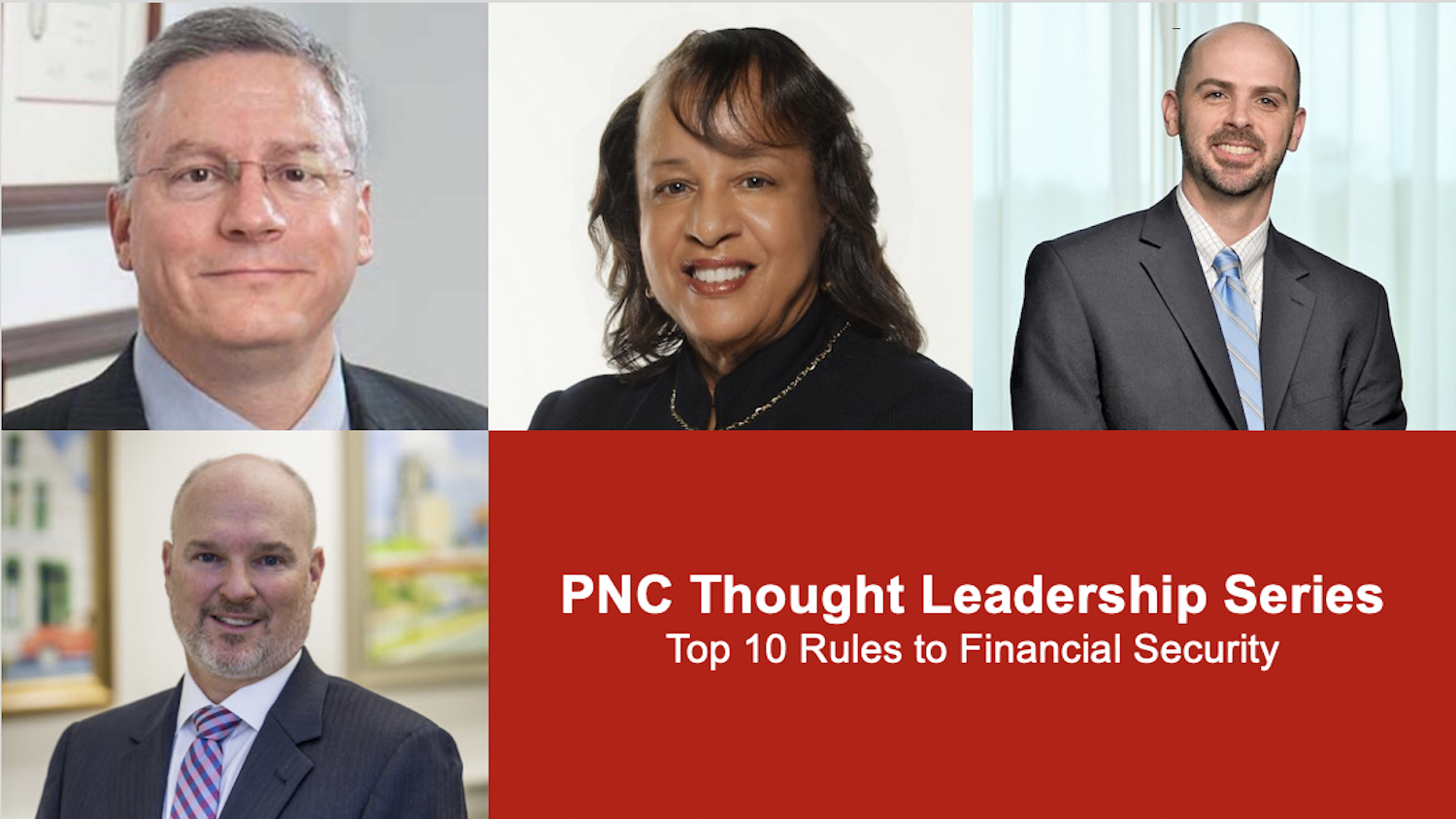Top Ten Rules to Financial Security
The latest installment of the PNC Thought Leadership Series explored financial security and how to make it an attainable goal for most people.
With a variety of investment strategies available, it seems surprising that one in five – 21 percent – of working Americans don’t save any of their annual income. The latest installment of the PNC Thought Leadership Series was the first virtual event hosted on October 13 by PNC Bank and NC State Poole College of Management with a focus on financial security. According to the experts, financial security is an attainable goal for most people, provided they make informed and sensible decisions.
The panel discussion, focused around the top ten rules for financial security, was led by a Jenkins MBA student, Beth Philemon, and featured experts from PNC, Realm Investment Consulting, Cherry Bekaert and Guardian Wealth Partners.
So when is the best time to start saving? What is good debt vs. bad debt? How do young people optimize their salary now in a way that benefits them down the road? Our experts weigh in on all these topics and more…
Meet the Experts:
Lori Jones Gibbs, SVP of Community Development Banking for The Carolinas, PNC
Lori Jones Gibbs is the senior vice president of community development of the Carolinas for PNC. In this capacity, she leads a team of people who focus on how PNC can partner with organizations to initiate and/or expand existing community and economic development activities. Jones Gibbs is the author of the book Yes, I Would Marry Him Again, Wives Salute Their African American Husbands and co-author of YES, You’re Approved! The Real Deal About Getting a Mortgage and Buying A Home. She is a graduate of the University of Connecticut and also holds a master’s degree from the University of Bridgeport. Gibbs is married to Kenneth Gibbs and they are the proud parents of three adult children and five grandchildren.
Ron Elmer, President, Realm Investment Consulting
Ron Elmer brings over 25 years of diversified financial industry experience to the table that includes the management of investment portfolios for clients like Boeing, Chrysler, IBM, Walgreens and the states of North Carolina, Georgia and California. Elmer is the current president of REALM Investment Consulting and has previously taught finance courses at NC State and Strayer University. Elmer earned his bachelor’s degree in business administration from the University of Oklahoma and his Master of Business Administration with a concentration in finance and accounting from New York University. The Montana native now resides in Cary, North Carolina, with his wife and twin children.
Jonathan Kraftchick, Partner, Cherry Bekaert
Jonathan Kraftchick serves as a partner in the Raleigh office of Cherry Bekaert as the head of the firm’s innovation and, since 2001, has conducted audit engagements for a variety of companies and industries throughout the country, as well as writing and delivering courses both inside and outside of the firm. Outside of Cherry Bekaert, Kraftchick is an adjunct professor at Elon University in their accounting department. In 2015, Jonathan was awarded the “Taking it to the Max” award by the North Carolina Association of Certified Public Accountants (NCACPA), which honors the legacy of former NCACPA Chair Maximo Mukelabai. He was also the first-ever recipient of the NCACPA Elevating Women Award, which recognizes a male in the CPA profession who actively supports the advancement of women. Kraftchick received both his Bachelor of Arts in economics and his Master of Accounting from the University of North Carolina at Chapel Hill.
Russell Smith ’86, Partner, Guardian Wealth Partners, LLC
Russell Smith is a licensed certified financial planner with over 30 years of professional experience in financial services and is a member of leading pension and financial services organizations, including the Financial Planning Association (FPA) and the American Society of Pension Professionals and Actuaries (ASPPA) and sister organization the National Association of Plan Advisors (NAPA). Smith is an alumnus of the Poole College of Management as he received his Bachelor of Science in economics as wells as a minor in mathematics in 1986. He is now an owner and partner of Guardian Wealth Partners, LLC, and his business focus is centered on advising ERISA pension and 401(k) plans. Smith provides design, implementation, investment management, communication and education services to qualified and non-qualified retirement plans.
Below are some highlights.*
*Please note some of the responses were condensed for clarity and brevity
Top 10 Rules to Financial Security
- Understand you must start now.
- Understand your salary.
- Understand your debt.
- Understand your investing opportunity.
- Understand who can help you.
- Optimize what you’ve done.
- Optimize your salary.
- Optimize your debt.
- Optimize current investments.
- Optimize communications.
What does financial security mean to you?
Kraftchick: Financial security – or financial literacy or independence – really means enabling the lifestyle that you want or achieving the dreams that you have for yourself. And money is a big component of that. Dreams have a cost, and that’s not a bad thing – we just got to have a plan for them. Financial independence or security is using money as a tool to get you the life that you want.
Elmer: Financial security is being confident and comfortable that you are doing the right things and not having to lay awake worrying about tomorrow and finances, no matter where you are on that schedule in your life.
Gibbs: You’re designed so that your paycheck moves you. I’ve taken steps by making investments that will be long-lasting and making sure that savings have always been part of my plan because once I stop working, I want the paycheck to continue to outlive me. When it outlives me, then it goes to my children as part of their inheritance.
Smith: Originally, it means having enough money to fund your lifestyle and your financial goals. If you’re on the younger side of this, it means covering your bills and having a safety net for unforeseen things. As you get older, it may be more along the lines of chasing your dreams, traveling, starting a business, putting your kids through college – whatever your objectives are. And then, for others closer to retirement, it might mean having the confidence to walk away and enter retirement on your terms. There’s a comment that I always follow, which is, “Money can’t buy happiness, but poverty can’t buy anything.”
Why is it so important to start saving and investing early?
Elmer: The basics of finance is that there is a time value to money, meaning $1 today is worth more than $1 tomorrow because that dollar today can be invested and grow over time. Another example I like to use that might be more relevant to undergrads, is that one of the first big purchases they’ll make is a car. So I always used to ask my students, “How much does a $30,000 car cost?” and I’ll repeat that question. And people will say, “Well, he just told me it cost $30,000.” But if you borrow the money at 5% interest for a five-year loan, your monthly payment will be $566 a month. That’s 60 payments at $566. You actually paid $34,000 for that car. Now let’s say instead of buying a car, you save $566 every month and you put it in an investment account paying 5% interest on the loan – you would accumulate $30,000 in just four years instead of five years. Let’s do the math again – $566 a month for 48 months is $27,000. So that $30,000 car can cost you $34,000, or it can cost you $27,000 – depending on whether you want to be a borrower or you want to be a saver.
What does it mean to really understand your salary in terms of how to budget living expenses, retirement and more?
Kraftchick: Salary is a tough one because some people are tempted to view salary as a scorecard. And while a salary is certainly the beginning of financial independence, it is definitely not the end. I have a lot of friends who make a lot less than me and a lot of friends who make a lot more than me – and their financial stories are very detached from their salary. I think a lot of times you’re tempted to think, “I just want to make as much money as I can.” And that’s great, but to me, that’s an ego-driven behavior that doesn’t enable you to live a life that you want to have. So while salary is an important piece, the other part of your question is about all the expenses that come into it. Salaries are just one line on your financial statement. There’s a lot more to your financial plan than just the revenue side. When it comes down to mapping out milestones in your life, like buying a house or car, you need to know the true cost – and think about those things early in your career.
There are different types of debt – what do people on their financial journey need to understand about debt?
Gibbs: To get a handle on debt, you need to know your salary, but you also need to know what’s called your “net income.” I find people who tell me they make $100,00 a year but then when you take out FICA taxes, health insurance, retirement and other expenses – what they are bringing home – that’s their net. And that’s what you need to learn to live on. There’s good debt and bad debt. Good debt is buying a home. Why pay someone else’s mortgage when you can eventually own your own home? Good debt is paying to go to college to hopefully increase your salary opportunities. Bad debt is debt that puts you in a stressful situation – like credit card debt you’ve overextended. You need to make sure you use credit wisely.
Elmer: And keep in mind, the CPA-side of me needs to point out that credit card and car loan interest is not tax-deductible, but mortgage interest and student loan interest is potentially tax-deductible. I’d rather folks borrow money that’s tax-deductible instead of what’s not.
How do you help someone at the beginning of their financial journey understand their investment opportunities?
Smith: My first rule of thumb is to take action, knowing that saving is his lifetime commitment. It’s a great behavior to adopt – it’s an offensive approach to growing wealth. Defenses are protecting downside risk issues – such as having three to six to nine months emergency savings and making sure that you’ve got things like your health insurance policies in place. And I always say start immediately – there’s never a bad time to start investing. I did a little math: if you are trying to grow your wealth and gain a million dollars at retirement age 65, a 25-year-old with 40 years to retirement would need to save $286 per month to reach a million dollars – assuming 8% interest. A 35-year-old would have to save $671 for 30 years to reach the same million, and a 45-year-old would have to save almost $1,700 a month, and a 55-year old, $5,500 a month. Also, keep in mind short-term and long-term objectives. Buying a house or car or getting married is a short-term objective. Saving for retirement is a long-term objective. The length of the objective should set not only the savings rate but the investment risk you’re willing to take. You have to take a vested interest in your money, so educate yourself – no one will look after your money better than you. Build a strategy around risk and rebalance occasionally – to me, that is the best approach to building wealth.
Who can help you build financial security?
Elmer: You want to go to a CPA for taxes, a certified financial planner for investments, an attorney for your will and estate planning, and then an insurance agent for your insurance needs, whether that’s life or home or auto insurance. These are four very distinct groups. In some respects, you want them to stay in their lane, but at the same time, it’s crucial that they speak to each other, especially if you have a situation where you have a CPA who handles your taxes, and a CFP who handles your investments. Investments affect taxes and taxes affect investments, so you need these two people to communicate with each other.
Once you’ve built a foundation for financial security, how do you begin to optimize it?
Kraftchick: It’s important to not just have a budget, but actually adhere to it. I would encourage you that monthly budgets are important for not just tracking ‘where did my money go this month?,’ but also in creating annual budgets or even five-year budgets. We talked earlier about salary, debt and investments, but it really comes down to the choices and habits you make to optimize your financial future. I can’t stress it enough – you have to plan for those big milestones.
How can you better allocate your salary with financial security in mind?
Smith: I think you break it down to needs versus wants, and then live within your means and stay within your budget. Once you figure this out, it becomes clear. Getting back to salary, I think the first thing I like to talk about is paying yourself first. You’ve probably heard this before, but it’s basically setting aside money automatically through payroll deductions for those savings objectives that tend to be more long-term or savings-focused. For retirement planning, see if your business has matching capabilities. Younger people need to save in the five-to-ten-percent range with their employer to get you where you typically need to go at retirement. Many folks coming out of college are going to have college debt and it’s important, I think, to retire that debt as soon as you can. It becomes a balancing act between whether you fund your retirement or pay off your college debt. Retiring high credit card debt is also important. Also, you need to fund your retirement and consider life insurance – getting your insurability established is probably the most important thing at a young age.
What does it mean to optimize your debt?
Gibbs: We must manage debt because we don’t want debt to manage us. I think buying a house and making an extra payment is an excellent tool for not only paying down good debt, but also your home is the one thing that actually builds equity. The equity that you build in your home can allow you to invest in other opportunities. We also need to avoid making minimum payments on bad debt, and understand our credit score, because we may need to go back and renegotiate debt. Remember debt can be beneficial to anyone, but we have to use it wisely and remember debt is the use of other people’s money that we promised to repay.
How do you make the most out of your investments?
Elmer: One personal rule I share with clients: never pass up a tax deduction. Also remember, when it comes to optimizing your investments, remember that stocks pay dividends and bonds pay interest. Interest is taxable at a higher rate than dividends. If we put bonds in the 401k stocks in the taxable account, we haven’t changed the investment profile risk, but we’ve optimized the tax situation.
Smith: Remember, there’s really no panacea to investment where costs always go up and never go down. There’s always trade-offs.
Why is it important to communicate with loved ones about your financial plans?
Gibbs: I think communication should be time-appropriate and age-appropriate. My husband and I have redone our will five times because our kids were at different ages, and we needed to ensure our will was appropriate for them at that time. Whenever my husband and I go on a trip, I send my kids an email letting them know where we keep all our important papers so they have access to them in case of emergencies. One of the worst things we can do is not let our loved ones know where to find what we may have left for them. Make sure you have an updated financial plan and personal financial statement and keep it someplace where your family members could find it. And have an attorney and an estate plan!
- Categories:
- Series:



